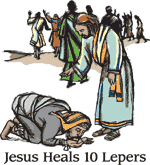Thankful Living is a Sign of Character
None of us
have much respect for the person unwilling to take the time to say thanks.
Saying “Thank-you” is one of those things in life that separate the sheep and
the goats. Everyone may feel gratitude,
but to go to the troubled of expressing that gratitude is a sign of
character. It says something about the
kind of person you are.
One can only
imagine the joy of those lepers in Luke’s Gospel when they were healed by
Jesus—jumping, shouting, and praising God.
What a celebration they must have had when they discovered their
decaying and disfigured bodies had been made whole. They must have been delirious with joy.
A man who
played the French horn in the Salvation Army band used to say, “When I think of
what the Lord has done for me, I could just blow this old horn out
straight.” That is how these ten lepers
must have felt.
For a child
of God, thankfulness is not confined to a day or a season, it is an attitude
that we should have every minute of every day.
Have you remembered to thank God for: a good night’s sleep, a day of
blue sky and sunshine that gets you outside, a day of gray skies and drizzle
that keeps you inside, the unexpected voice of a distant friend on the
telephone, the comfort of the Psalms, Mozart, Haagen-Dazs, uncontrollable
laughter, unashamed tears, your spouse, your children.
The greatest
instrument of healing God has ever used in this world only needed to be
employed one time. That single act of
healing was the cross. Our greatest wounds,
our most serious infirmities, our most malicious malignancies, were all wiped
out by this radical act of spiritual surgery.
Through Jesus’ sacrifice, the destructive power of death was crushed,
leaving in its place our choice for health and wholeness.
The
paraphrase of Psalm 111 goes like this:
“My heart is full today. I am so
grateful for all that God has done for me.
I need but crawl out of my corner of depression and self-pity and look
around me to see how great my God is.”
Go With God,
Pastor Qualley





